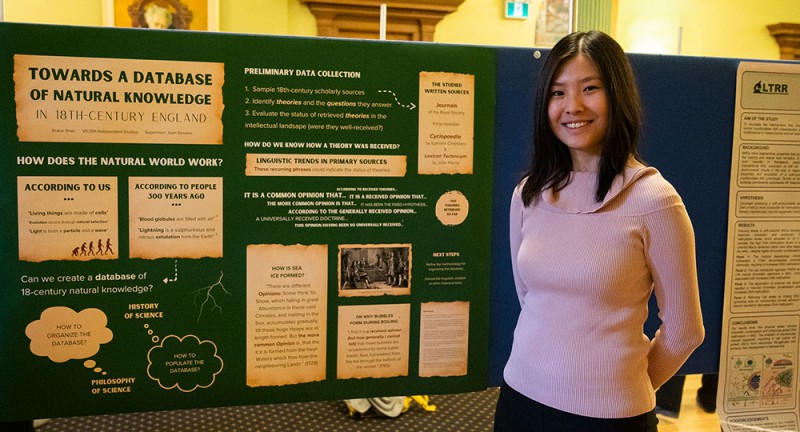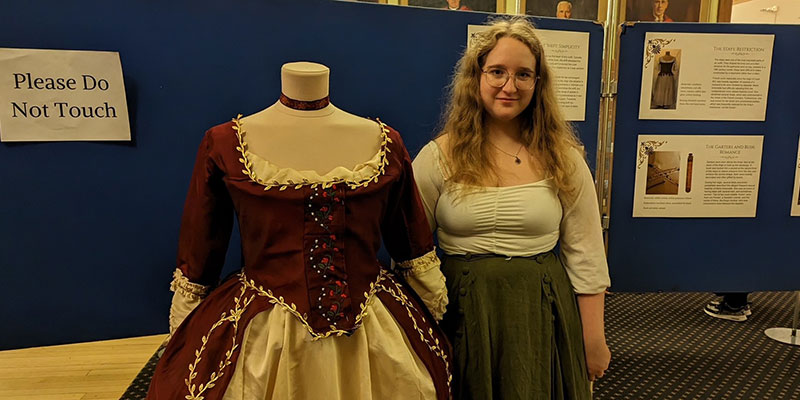Victoria College Research Day Shines Spotlight on Undergrad Efforts

Grace Shan, a third-year student, shares her work with the Vic community during Research Day. Shan's research analyzed language patterns in English journals from the 18th century to better understand people's perceptions of the natural world at the time. (Photo by Minh Truong)
By Dan Blackwell
From the fashion of Marie Antoinette to the role of student-led food programs on university campuses, undergraduate researchers tackled an eclectic range of topics at this year's Research Day. Held on March 27 in the foyer of Old Vic, Research Day brought together undergraduate students to present their research to peers and faculty and featured a capstone symposium, a keynote address by Paul Dietz, Distinguished Engineer in Residence from the Department of Computer Science, and an award ceremony recognizing standout undergraduate researchers in multiple fields.
The event’s organizer, Vic undergraduate research coordinator Professor Shaun Ross, says he was thrilled to see the return of in-person activities following years of virtual Research Days. “2019 was the last time we did it in person. Presenting in person provides the opportunity and time to engage with the work of others," says Ross. "You don’t get the same opportunity to interact with people from different disciplines when you’re working remotely.”
Third-year student Grace Shan, whose research on 18th-century natural knowledge was awarded the E.J. Pratt Library Primary Source Prize, says Research Day provided a valuable opportunity to share her work face-to-face with the Vic community.
“Research Day was the first time I’ve ever really talked about my research with somebody outside of my academic context,” says Shan. “The opportunity to give a quick presentation about the most important parts of my work was very useful.”
Shan’s research examined and catalogued language used in 18th-century English journals, identifying linguistic trends and patterns to shed light on how people from that time period understood the natural world. While Shan was already confident in her findings, she says participating in Research Day pushed her to think differently about how she showcases her work.
“When you’re getting ready to present your research this way, it’s almost like a test to figure out if you really know what you’re doing," she says. "If you can’t explain it to somebody who has never seen this type of research before, then you might not understand it very well yourself.”
Ross says this process of rethinking how to communicate one’s research is one of the primary benefits of the annual event.
“It’s all about distillation and translation. To put something into poster format effectively, you really have to boil it down to the key points. Students have to be able to talk about what matters to people who don't speak their jargon,” he says.
Ross adds that Research Day is also a rare opportunity for students outside of the sciences to exhibit their work. He says research used to be reserved almost exclusively for faculty and graduate students, while undergrads, especially those in the humanities, would often receive a passive education.
“We have a real range of diverse and important types of research going on here, and Research Day brings them together in a very special way,” he says. “It's quite exceptional for an undergraduate student in the humanities to do a poster presentation like this.”
Tara Downie, a third-year student studying history and material culture, says she was surprised to find herself presenting her research, titled "Fatal Fashion: An Examination of Marie Antoinette Through Dress," at Research Day. This achievement was made possible in part by her selection as a recipient of the Northrop Frye Research Grant, which aims to facilitate the pursuit of humanities and social science research by Victoria College students. In her presentation, Downie shared her meticulous efforts to recreate an 18th-century dress, which required a staggering 400 hours and over a year to complete.

Third-year student Tara Downie presents her research on 'Fatal Fashion: An Examination of Marie Antoinette Through Dress' at Research Day. Earlier in the day, Downie presented her work at the Northrop Frye Centre Undergraduate Fellow Symposium. (Photo by Dan Blackwell)
“A lot of my friends are in the sciences, working in labs,” she says. “I never imagined there was this much of an opportunity for humanities research at Vic, and that I’d be presenting something that I’m so passionate about.”
Offering these types of unique research opportunities is a priority for Vic, Ross says.
“Undergraduate research has been a specific mandate of the College, and it’s going to continue to be so going forward.”
Victoria College provides comprehensive support for undergraduate research through various initiatives. Besides appointing Ross as an undergraduate research coordinator to mentor students and organize research-related events like Research Day, the College also launched the Jackman Scholars-in-Residence program, which offers an intensive summer research residency for upper-year undergraduates in humanities and social sciences. Additionally, the College's research centers, including the Centre for Renaissance and Reformation Studies and Northrop Frye Centre, employ undergrad research fellows, with the latter having a special mandate to facilitate and support undergraduate research in humanities and social sciences. Many courses at Victoria College also have strong research components, ranging from Vic One to final-year Capstone Colloquia.
“Increasingly, higher education institutions around the world have looked for ways to make undergraduate students part of the research mandate of the university. Victoria College has been a leader in this regard and has made this a strategic priority in our goals,” says Ross.
“We're finding ways to help students transform from being passive receivers of knowledge to active producers of it.”
2023 Research Day Prize Winners
- Science, Technology and Society Award: Jessica Stockdale, "Transitions to Success: How Access Programs Create Bridges to Science"
- E.J. Pratt Library Primary Source Research Prize: Grace Shan, "Towards a database of natural knowledge in 18th-century England"
- Dean of Students’ Social Impact Awards:
- Erica de Souza, "OHT’s Management of Natural Heritage Sites: Ellis & Nochemowenaing Properties"
- Julia Chapman, "Canadian-Trinidadian Activism: Navigating Intersectional Identity in Queer Care"
- Aisling Brody, "Do anxiety & depression affect how people who are gay, bisexual, and other men who have sex with men (GBM) protect themselves against HIV?"
- Principal’s Science Award: Sarah MacPherson, "No ovaries? More sleep medication"
- Student Choice Award (Voted on by U of T community): Alishba Afaq, "Repeated Concussions in Female Mice May Trigger Immune Destruction of the Brain"
Vic alumni and friends' generosity impacts students and their research achievements. Such funding enables academic pursuits and maximizes potential. To contribute and make a meaningful impact on Victoria College's student community, please visit the link.
